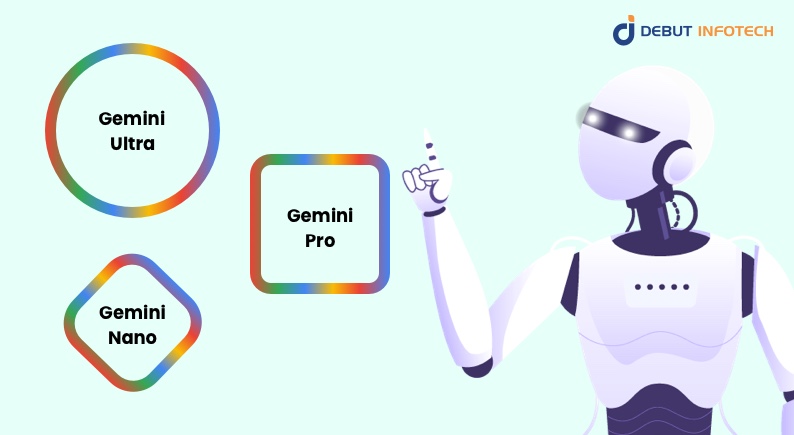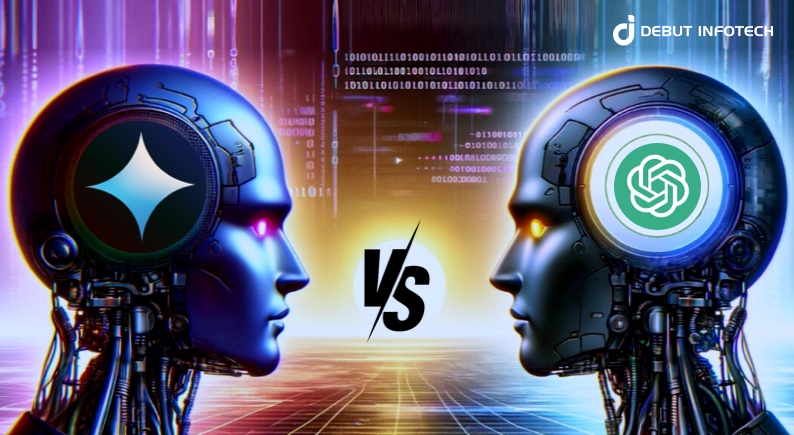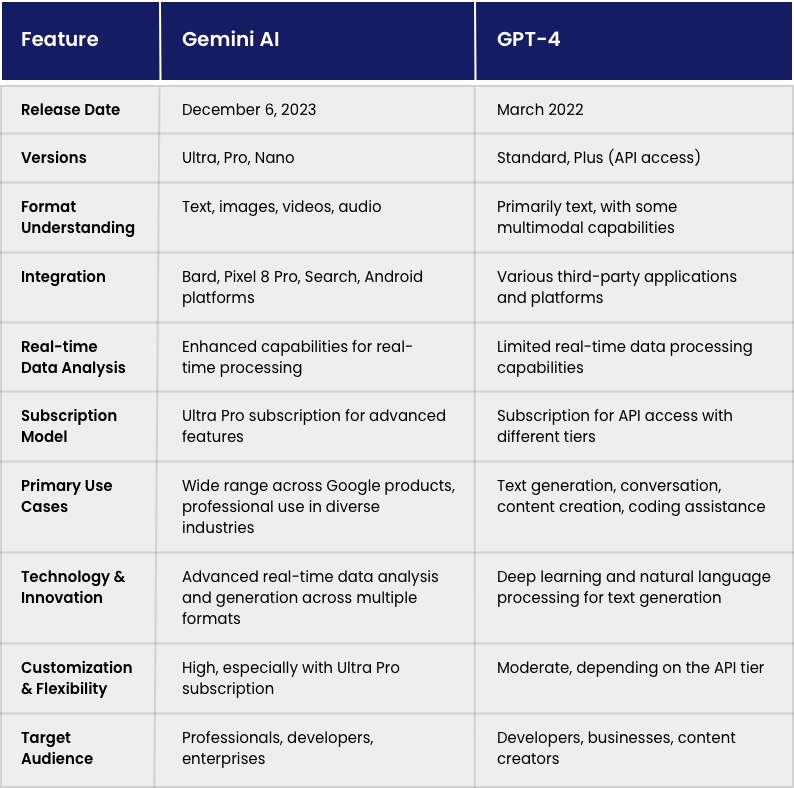Table of Contents
Home / Blog / AI/ML
Google Rolled Out Gemini AI – The Superior Model Surpassing GPT-4
February 15, 2024

February 15, 2024
Google’s latest venture into the AI frontier, Gemini AI, has been making waves since its debut. Developed by the tech giant’s AI research labs, DeepMind and Google Research, Gemini AI showcases Google’s ambition to lead in the generative AI platform space. This revolutionary technology, still shrouded in anticipation, has sparked a flurry of questions and comparisons.
How does Gemini AI stack up against existing giants like ChatGPT? Is Gemini out yet, and how can we harness its capabilities? Let’s dive into the world of Gemini AI, exploring its potential to redefine our interaction with information.
What is Gemini AI?
Gemini AI, developed by Google, represents the pinnacle of innovation in artificial intelligence. Designed to think, learn, and create with a near-human level of understanding, Gemini AI marks a significant leap forward in AI capabilities. Its intuitive design seamlessly integrates with various applications, making it a versatile asset across industries.
Whether it’s enhancing data analysis, driving autonomous technology, or revolutionizing customer service, Gemini AI adapts and excels. Google’s commitment to ethical AI development ensures Gemini AI not only pushes the boundaries of what machines can do but also prioritizes security, privacy, and fairness. Gemini AI is not just a tool; it’s the next step in AI evolution, promising to transform our world.
Added to this, Gemini AI emerges as Google’s next-gen generative AI model family, offering three distinct versions tailored to diverse needs:

- Gemini Ultra: The flagship model designed for comprehensive AI tasks.
- Gemini Pro: A lighter version, offering a balance of performance and efficiency.
- Gemini Nano: A compact model optimized for mobile devices, including the Pixel 8 Pro.
Unlike its predecessors, Gemini AI is “natively multimodal,” capable of understanding and generating content beyond text to include audio, images, and videos. This broadens its application significantly, setting it apart from text-only models like LaMDA.
The Dawn of a New Era: Google Gemini AI Release Date
As anticipation builds, the question on everyone’s lips is, “How can I use Gemini AI, and when?” While specific details about the Google Gemini AI release date remain closely guarded, the tech community buzzes with speculation and excitement. This unveiling is poised to mark a significant milestone in AI development, promising to expand our capabilities in real-time analysis and decision-making.
Google Gemini vs. Bard: A Friendly Rivalry

The comparison between Google Gemini and Bard highlights the diverse approaches within Google’s AI ecosystem. While Bard excels in generating human-like responses, Gemini’s forte lies in its ability to parse and understand real-time data. This distinction underscores Google’s commitment to pushing the boundaries of what AI can achieve, catering to a broad spectrum of user needs and applications.
To provide a detailed review, we’ll create a comparison table highlighting key differences and features of Google’s Gemini AI and GPT-4. This table will focus on aspects such as technology, capabilities, applications, and subscription models, giving a comprehensive overview of how these two advanced AI models stack up against each other.

Harnessing the Power of Gemini AI
Eager to get your hands on Gemini AI? The path to experiencing this cutting-edge technology involves staying updated with Google’s announcements and participating in any beta programs that may offer a sneak peek. Whether you’re a developer, a marketer, or just an AI enthusiast, the opportunity to test Gemini AI firsthand will provide invaluable insights into its potential impact.
Integrating Gemini with Bard
The intrigue around Gemini AI doesn’t stop at its standalone capabilities. How to use Gemini with Bard, Google’s other AI marvel, is a topic of much discussion. This integration could unlock synergies between Gemini’s real-time analysis and Bard’s conversational intelligence, setting a new standard for AI-driven interactions.
Looking Ahead: The Impact of Gemini AI
As we stand on the cusp of Gemini AI’s debut, its potential to transform industries and everyday life is palpable. From enhancing real-time decision-making in business to offering more contextual and timely information to users, Gemini AI is poised to become a pivotal force in the AI landscape.
Conclusion: Embracing the Gemini Revolution
The journey into the age of Gemini AI is fraught with questions, excitement, and anticipation. As Google prepares to unveil this groundbreaking technology, we are reminded of the endless possibilities that AI holds. By staying informed and ready to adapt, we can all be part of the Gemini revolution, leveraging AI to unlock new levels of understanding and interaction with the world around us.
In conclusion, while we eagerly await more details on the Google Gemini AI release date and capabilities, it’s clear that this technology is set to redefine the boundaries of artificial intelligence. Whether through its rivalry with Bard or its comparison with ChatGPT, Gemini AI represents Google’s commitment to innovation and its vision for a future where AI and real-time information analysis are seamlessly intertwined.
FAQs
Q. How does Gemini AI work?
A. Gemini AI operates through a combination of advanced algorithms and machine learning techniques. It leverages neural networks to analyze and interpret data, enabling it to generate responses or recommendations based on the input it receives. By continuously learning from new data, Gemini refines its understanding and improves its performance over time.
Q. How will Gemini impact the future of AI?
A. Gemini is expected to have a profound impact on the future of AI by pushing the boundaries of what is achievable with artificial intelligence technology. Its innovative approach to data analysis and interpretation opens up new possibilities for applications across various industries. Gemini’s ability to process and understand complex data sets has the potential to revolutionize fields such as finance, healthcare, and customer service, leading to more efficient and intelligent systems.
Q. Which one is best, ChatGPT or Google Gemini?
A. The choice between ChatGPT and Google Gemini depends on specific requirements and preferences. ChatGPT, developed by OpenAI, specializes in natural language processing and conversation generation, making it ideal for chatbots and text-based applications. On the other hand, Google Gemini offers a broader range of AI capabilities, including image recognition, speech recognition, and natural language understanding, making it suitable for diverse AI applications beyond text-based interactions. Ultimately, the best option depends on the specific use case and the desired functionalities of the AI system.
Q. How to develop an app like Gemini AI?
A. To develop an app similar to Gemini AI, follow these steps:
- Define the scope and objectives of the application.
- Gather a team of skilled developers and AI experts.
- Select appropriate AI technologies and frameworks for data analysis and interpretation.
- Design and implement algorithms for processing and understanding input data.
- Develop an intuitive user interface for interaction with the AI system.
- Test the application thoroughly to ensure accuracy and reliability.
- Deploy the app and continuously iterate based on user feedback and performance metrics.
Q. How much does Gemini cost?
A. The cost of implementing a system similar to Gemini AI can vary depending on factors such as the complexity of the application, the scale of deployment, and the expertise required for development. Expenses may include personnel costs for developers and AI specialists, infrastructure costs for computing resources, and ongoing maintenance and support expenses. It’s advisable to consult with experts and conduct a thorough cost analysis to determine the budget required for developing and operating a Gemini-like AI system.
Talk With Our Expert
USA
2102 Linden LN, Palatine, IL 60067
+1-703-537-5009
[email protected]
UK
Debut Infotech Pvt Ltd
7 Pound Close, Yarnton, Oxfordshire, OX51QG
+44-770-304-0079
[email protected]
Canada
Debut Infotech Pvt Ltd
326 Parkvale Drive, Kitchener, ON N2R1Y7
+1-703-537-5009
[email protected]
INDIA
Debut Infotech Pvt Ltd
C-204, Ground floor, Industrial Area Phase 8B, Mohali, PB 160055
9888402396
[email protected]




Leave a Comment